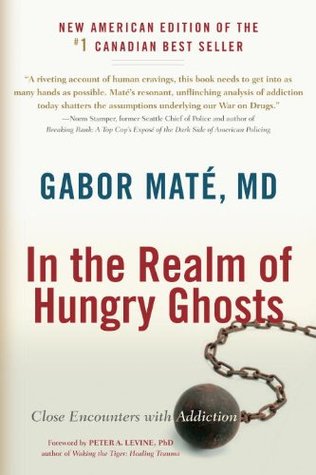More on this book
Community
Kindle Notes & Highlights
by
Gabor Maté
Read between
May 12 - May 29, 2024
helps the public understand the plight of addicted people, if it helps to foster a new appreciation for the brain science of addiction, if it helps erode the false beliefs that drive the War on Drugs, and—above all—if it triggers a frisson of self-recognition in the reader.
spectrum of addictions, including shopping, work, food, nicotine, the Internet, cosmetic surgery, even exercise.
mandala, the Buddhist wheel of life, revolves through six realms.
seek something outside ourselves to curb an insatiable yearning for relief or fulfillment.
no human being is ever beyond redemption.
“They need a space where they can exist without being judged and hounded and harassed. These are people who are frequently viewed as liabilities, blamed for crime and social ills, and … seen as a waste of time and energy. They are regarded harshly even by people who make compassion their careers.”
One constant at the Portland Clinic is pain. Medical school teaches the three signs of inflammation, in Latin: calor, rubror, dolor—heat, redness, and pain.
I could not rescue people from their pain and sadness. All I could offer was to walk beside them as a fellow human being, a kindred spirit.
the little walking figure, Laura chimes up, her tone a shade sardonic: “White man says go.”
if the simplistic view were accurate: that human beings need only negative consequences to teach them hard lessons.
“Nothing bothers me when I’m high. There’s no stress in my life,”
either you’re too much trouble to be allowed to live here or you’re so much trouble you can live only here. “And die only here,”
Thomas De Quincey was an opium user. “The subtle powers lodged in this mighty drug,” he rhapsodized, “tranquilize all irritations of the nervous system
Addictions always originate in pain, whether felt openly or hidden in the unconscious.
never “Why the addiction?” but “Why the pain?”
severe neglect and maltreatment early in life.
sexually assaulted in childhood,
rape, beatings, humiliation, rejection, abandonment, relentless character assassination.
deficient emptiness pervades our entire culture.
long to experience life in all its vividness, with full, untrammeled emotion.
drug is to offer the addict protection from pain while at the same time enabling her to engage the world with excitement and meaning.
the brain’s own mechanisms of dopamine secretion become lazy.
deep in his heart there must live a desire for a life of wholeness and integrity that may be too painful to acknowledge—painful because, in his eyes, it’s unattainable.
humbled by my feebleness in helping this person.
Spiritual teachings of all traditions enjoin us to see the divine in each other.
“So you’ve still been topping up your methadone with heroin. Why?” “Because I want that coma state, where I don’t feel anything.”
A fetus undergoing opiate withdrawal in utero may suffer neurological damage, so it’s better for the baby to come into the world with
an opiate dependence and to wean her from it gently postpartum. Cocaine is another matter.
on crack you’re not fit to be a mother. You yourself once said that you don’t get the best of a person when there’s an addiction.
The suffering Germans and rapacious Jews in his narrative are projections of his own phantoms.
Ralph aches for unity with the eternal feminine caritas—blessed, soul-saving divine love.
The misery is extraordinary in the drug gulag, but so is the humanity.
some policy makers seem to regard more as a potential embarrassment than as a humanitarian crisis.
sense our commitment to accepting them for who they are.
essence of harm reduction,
essence of any healing or nurturing ...
This highlight has been truncated due to consecutive passage length restrictions.
On Becoming a Person, the great American psychologist Carl Rogers described a warm, caring attitude, which he called unconditional positive regard because, he said, “...
This highlight has been truncated due to consecutive passage length restrictions.
Few of us have experienced it consistently; the addict has never experienced it—least of all from himself.
I hope one day you will find Peace.
His confession and his letter, unsent though it remains, eased his burden.
addictions could be defined as endeavors at controlling our life experiences with the help of external remedies.…
No external remedy improves our condition without, at the same time, making it worse. THOMAS HORA, MD Beyond the Dream: Awakening to Reality


